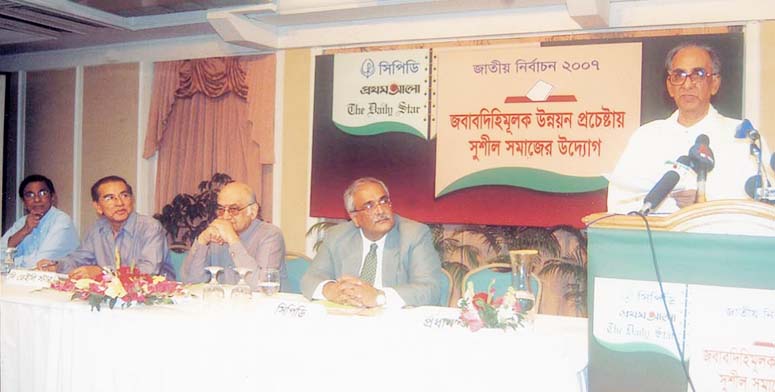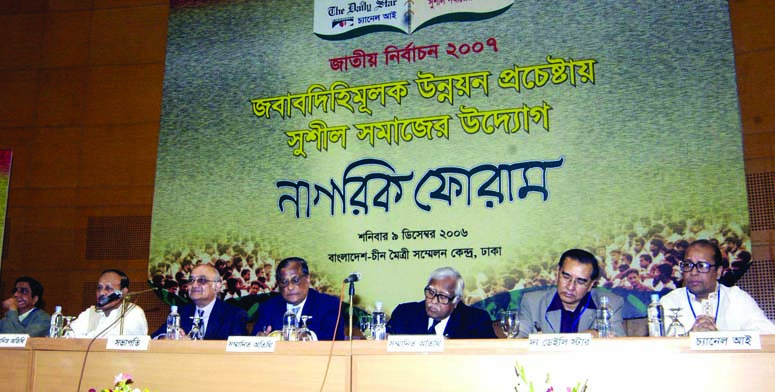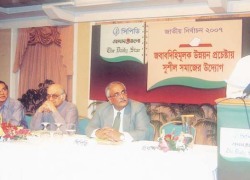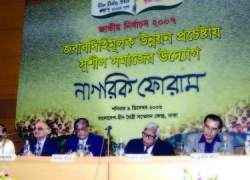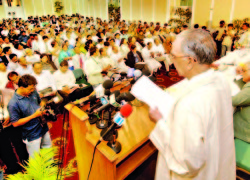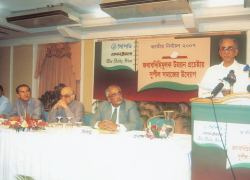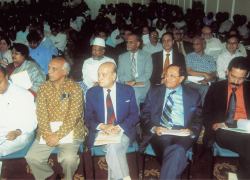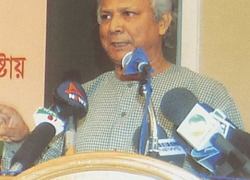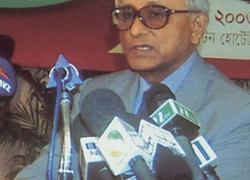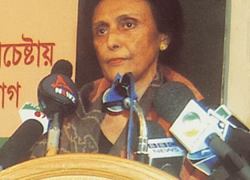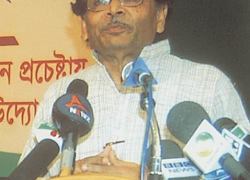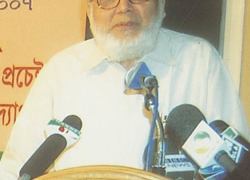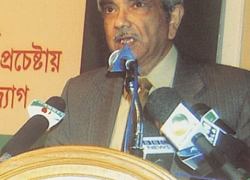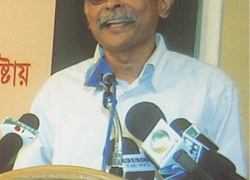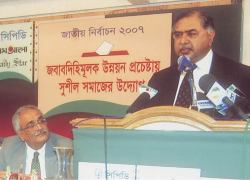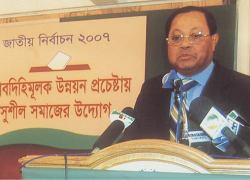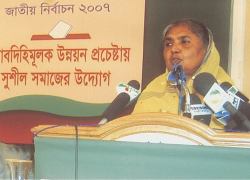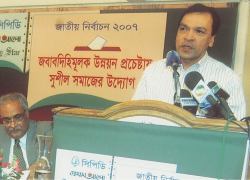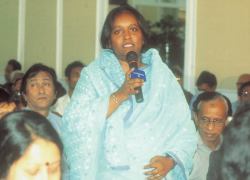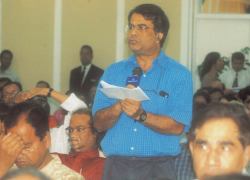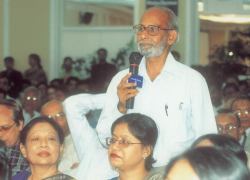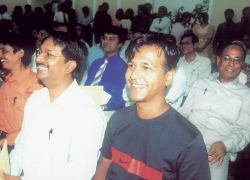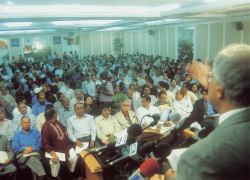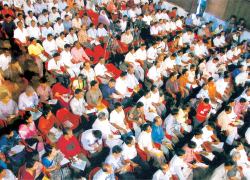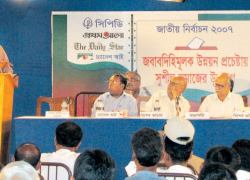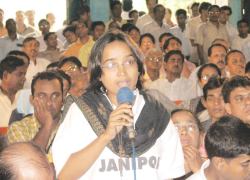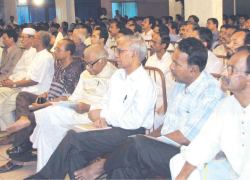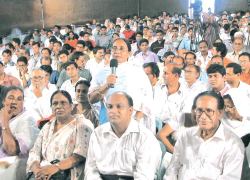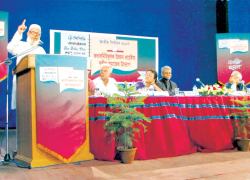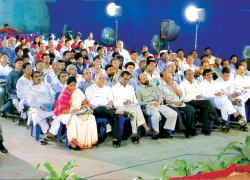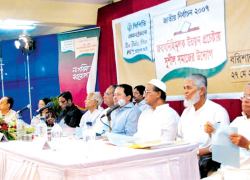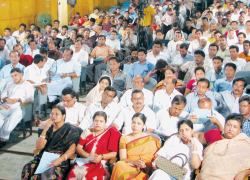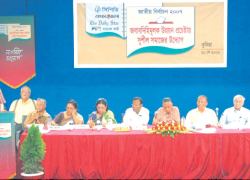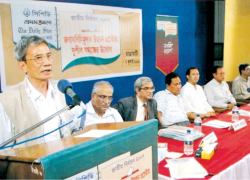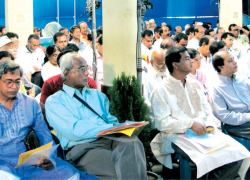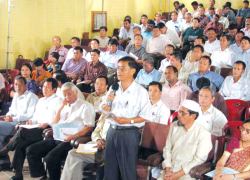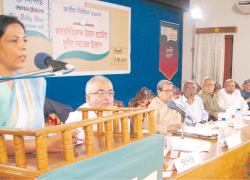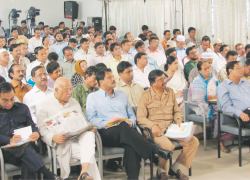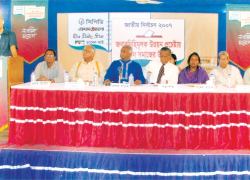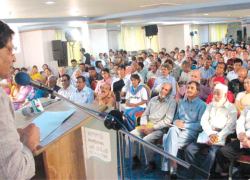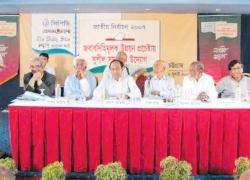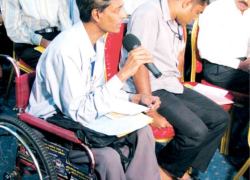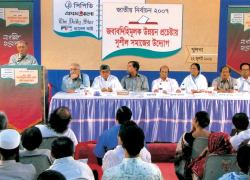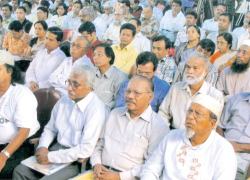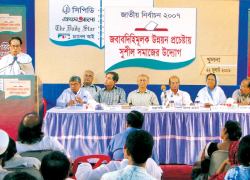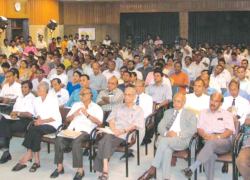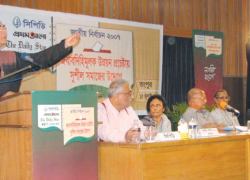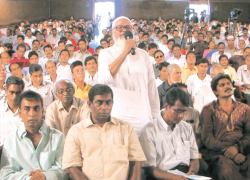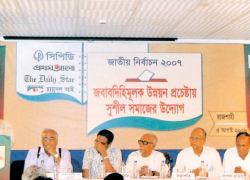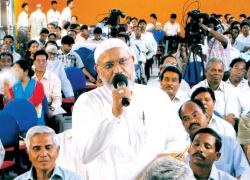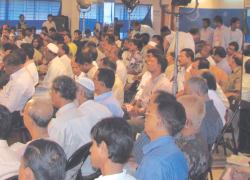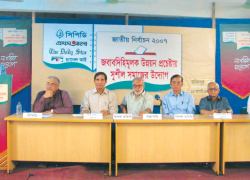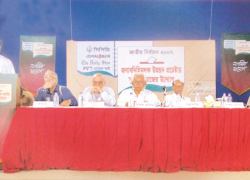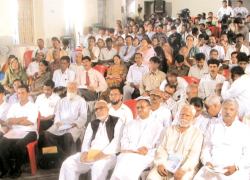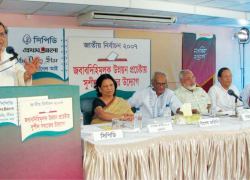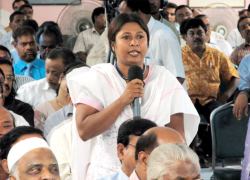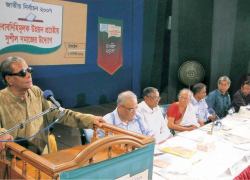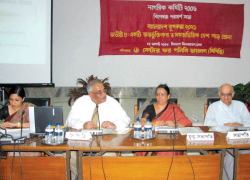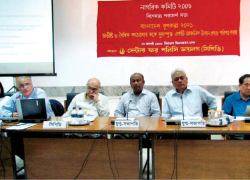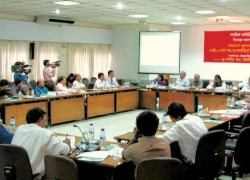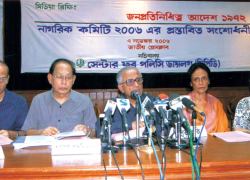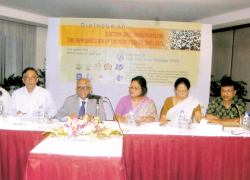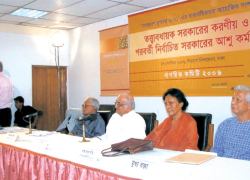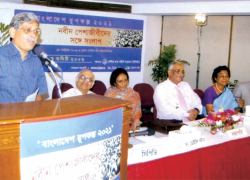The political context of the demand for the initiative
Following three successive democratic elections, when in 2006 Bangladesh was heading for yet another national election in an environment of entrenched and escalating confrontation between the two major political parties, people became apprehensive about the prospect of a credible election. The confrontational political scenario was emerging as a threat to the country’s hard-earned democracy as well as to the development process. The concerned citizens maintained that the upcoming election had to be not only credible, but also perceived to be free and fair by the nation. There were also concerns that the escalating hostility in the bi-polar political structure may deflect pre-election attention from the major developmental interests of the country.
In view of the above, there was widely held and expressed expectation that the civil society organisations involving development NGOs, citizens’ groups, media, and professional and trade bodies would play a responsible role in addressing the evolving situation. A large number of civil society stakeholders urged CPD to undertake initiatives to address the concerns of the citizens; they also promised their support in implementing the programmes. Indeed, CPD, given its track record and professional competence, goodwill and outreach, was well placed to mobilise the major actors around a set of concrete actions and make their voice heard in the corridors of power.
In this context, in early 2006 CPD embarked on a programme involving a series of activities for promoting an informed policy debate around critical national issues during the run-up to the national elections scheduled for January 2007.
The programme
In the above backdrop, CPD initiated a programme titled National Elections 2007: Civil Society Initiative for Accountable Development in March 2006. The twin objectives of the programme were to give voice to common citizens of the country so that their development interests and concerns got reflected in the election manifestos of the major political parties, and to influence public opinion to encourage and put pressure on political parties to nominate competent candidates to contest in the next parliamentary elections.
The programme was launched through a high profile public event in the presence of more than 500 people including high level representatives from all major political parties as well as trade bodies, academics, non-government policy activists and development practitioners, trade union leaders, gender rights and environmental activists, performing artists and distinguished personalities, young professionals and students. Nobel Laureate Professor Mohammad Yunus, also a founding member of CPD Board of Trustees, presented a paper highlighting the need for nominating and electing honest and competent candidates for the election. CPD shared with the participants a detailed activity plan and sought people’s support towards implementation of the programme. In carrying out the outreach, CPD took on board as strategic partner, three most prominent media institutions of the country – Prothom Alo (most circulated vernacular daily), The Daily Star (most circulated English daily) and Channel i (a leading television channel). Prior broad-based consultations with professional bodies, private development agencies, business community and media persons were held to broaden the ownership of the proposed programme.
The programme was implemented through eleven clusters of activities:
- An Eminent Citizen’s Group (Nagorik Committee) was constituted to prepare a “Vision” document which would formulate a medium-term outlook for Bangladesh, setting out specific goals and targets for the year 2021 when the country would celebrate its 50th year of independence. Prepared through a broad-based participatory process, the document was expected to influence the development programme of the incoming governments and would also serve as a reference point for the pre-election development discourse.
- Eight Task Forces were set up comprising of leading professionals to develop policy paper on specific issues that were to feed into the preparation of the vision document. The issues were identified through an interactive process and developed through wide ranging consultations.
- A draft of the revised Representation of People’s Order (RPO) was prepared indicating the amendments that were necessary to ensure that electoral laws and political conduct facilitate participation of honest and competent candidates, particularly by reducing the need for campaign financing, providing right to recall the member of parliament during tenure and the right to cast “No” vote.
- Fifteen day-long Town Hall meetings were organised in major districts of Bangladesh to provide a unique non-partisan platform for the stakeholders to voice their concerns and interests in the context of the then upcoming election process and also to prioritise national and local issues related to the development of the country. Maximum possible representation of the major constituencies and stakeholders were ensured through participation of the political leaders, academicians, business community, media, trade union leaders, students, cultural activists, ethnic and religious minorities, NGOs and grassroots level activists. Beyond elaborate Q&A session, a questionnaire was circulated to elicit views of the local people regarding national priorities and choices. These meetings were widely covered by the print and electronic media.
- Focus Group Discussions (FGDs) separately with international development partners, newspaper editors, TV channel executives, young professionals and legal experts were also organized at various points in time to share CPD’s thoughts on pre-election activities, programme outcomes and also to seek their expert opinion.
- Strategic partnerships and collaborative arrangements were forged with institutions and networks working in specific areas having relevance for the CPD’s programme. CPD also held interactive discussion with other groups and organizations involved with pre-election activities, through formal as well as informal discussions, to avoid duplication of work and to generate synergy.
- Engagement of the youths and non-resident Bangladeshi professionals were given special attention. Perspectives of these two groups were reflected in identifying and elaborating the development priorities.
- Besides the Town Hall, Expert Group Meetings, Focus Groups Discussion and other consultations, greater outreach was carried out through the following activities: (i) TV Talk Shows, (ii) Publication of special supplements in the newspapers (both Bangla and English) highlighting the discussions in the Town Hall meetings, (iii) video presentation of the summary of these discussions on TV, and (iv) advertisements in the media highlighting various activities undertaken as a part of the programme.
- At the end of the programme, closer to the election dates a National Policy Forum was held in Dhaka with audience drawn from all important stakeholder groups from across the country. Leaders of major political parties attended the Forum. A document prepared by the Citizen’s Committee through the earlier-described elaborate process titled “Vision 2021” and a report highlighting the discussions in various platforms were handed over to the General Secretaries of the two major political parties. The amendments to the election rules were handed over to the Election Commission for their consideration. Members of the Citizen’s committee also met the President of the country to hand over the reform proposals.
- The Vision document and reports on the launch meeting and Town Hall discussions were published and later distributed extensively among the citizens across the country.
- It was planned that after the elections, the newly elected government would be presented with these documents. Indeed, when national elections finally took place in December 2008 (it was delayed by two years), CPD organised a series of sessions with members of the incumbent government’s cabinet sharing with them the outcome of the programme. The sessions were held under the caption “Development with Equity and Justice: Immediate Tasks for the Newly Elected Government”.
The strategic approach of the programme
- Strategic approach of the CPD’s programme was to broaden the policy discourse in the country by bringing on board the structured stakeholder groups along with the participation of the concerned citizens. The strategic focus was to include the local and grassroots level concerns in the policy debates, which are usually confined to discussions dominated by urban elites in the capital. The programme thus sought to increase the sensitivity of the political leaders regarding perspectives of the general voters and thus improve both vertical and horizontal accountability.
- The other strategic concern was to enhance the awareness of the citizens about their rights to be engaged in public sphere of policy debates. To this end, CPD resorted to deployment of wide range of outreach tools including extensive use of print and electronic media as well as its website.
- CPD initiated its programme pretty early in the pre-election period. Admittedly, any substantive programme based on participatory approach always needs time to generate momentum. Also the programme was designed with some flexibility allowing mid-course correction and adjustment, if required.
- An important element of CPD’s strategy was to create a concrete output from the participatory process, which would be of lasting relevance and value. Besides the Vision document, elaborate documentation of the citizens’ dialogues remain as rich record of high level policy activism by non-state actors.
- In doing above, CPD tried to be mindful not to create competitive pressure on the political parties but rather to be seen as their partners in promoting good governance.
Impact on policy and capacity building of the institution
The impact of the CPD programme on policy may be assessed from immediate and short term as well as medium to long term perspectives. The programme was able to instil in the citizens the idea that they deserved better governance, decent elections and a fairer share in development. CPD’s programme brought to the fore the concept of ‘honest and competent candidates’ which caught the imagination of the people. At the concluding National Policy Forum held in December 2006, where the audience included about thirteen hundred people, the General Secretaries of both the major political parties made public commitments that they would give nomination to clean candidates, pursue good governance and encourage principled politics. They further committed that they would reflect the ideas generated through extensive public discussion in their manifesto and would pursue commensurate policies when in government. During the election campaign, publicity posters of many candidates included a common feature “I am a clean and competent candidate – please vote for me”. Indeed the newly elected Parliament included many new and relatively younger faces who were perceived to be relatively ‘clean’; some became Ministers in the Cabinet that was generally perceived to be clean.
The Bangladesh Vision 2021 document prepared under the auspices of the Citizens Committee set up at CPD’s initiative had included eight goals that got reflected in the election manifestos of the leading political parties. It is of interest and some satisfaction to note in this connection that the Awami League, the party which subsequently won the election, incidentally named its manifesto Vision 2021 and included many of the policy suggestions put forward in the CPD’s Bangladesh Vision 2021. Once in power, over the last three years, the Awami League took a number of legislative initiatives and undertook implementation of several programmes in line with the Vision doc recommendations, albeit with varying degree of success.
The proposals for amendment of the RPO 1972 prepared under the CPD initiative included suggestions as regards selection criteria for the candidates, financing of the election, transparent electoral process, preparation of a genuine voters list etc. When the Caretaker Government (CTG – an interim government to mainly conduct election) was formed in January 2007, many of the suggestions generated by the CPD’s programme were taken up by the Election Commission (EC) in their effort to conduct a free and fair election participated by relatively clean candidates. The amended RPO included, for the first time, the option of “No” vote in the ballot paper, a key proposal which emerged during local level consultation. Conducted by a committed, competent and non-partisan EC, the national elections held in 2008 were by far the most credible elections in Bangladesh’s history. Young voters participated in large numbers and, as mentioned earlier, many were elected to the Parliament for the first time supported by an anti-incumbency mood and a demand for ‘change’.
As the election was delayed and the CTG continued for about two years instead of three months, CPD also handed over the Vision document to the head of the CTG. Many of the initiatives pursued by this government towards good governance, tackling corruption, strengthening of local governments, regulatory reforms etc reflected citizens’ aspirations and bore the mark of what was contained in the Vision document.
After the elections, when CPD organised the two-day conference titled “Development with Equity and Justice: Immediate Tasks for the Newly Elected Government” in March 2009, it was participated by Ministers and high level policymakers of the newly elected government. This was a good opportunity to pursue the suggestions originating from CPD’s initiative. Indeed, since then CPD has continued to pursue the goals and targets identified in the Vision 2021 document, challenging the government to implement the policies advocated in its own election manifesto.
In the fifteen town hall meetings more than eight thousand people had taken part. On a number of occasions CPD had to face questions about its motive; questions were also raised whether CPD was serving the interest of any vested quarters or what was the source of financing of CPD activities. However, by practising its own code of transparency and accountability, being able to underwrite the related costs from internal sources (i.e. not taking programme support from any external agency) as well as through support of its strategic partners, CPD came out of this exercise in civic activism with its reputation not only intact, but further strengthened.
It must be mentioned that in 2006 when CPD initiated this programme, people were in pre-election mood. As such they were keenly interested in new ideas and receptive to those. The environment was very conducive for putting forward ideas about change. A non-partisan forum was something that was not there and was what people were looking for. In terms of strategy, the carefully designed extensive outreach programme, partnership with media and early start were some of the reasons that were instrumental in ensuring the expected impact.
In the course of this entire exercise it was revealed that if civil society is effectively motivated, there is a tremendous scope in Bangladesh for stimulating the spirit of civic activism in sustaining the democratic process and making the process of governance more accountable. Also CPD as an institution made a crucial transition, from a predominantly policy influencing and policy advocacy think tank to one also of policy activism with greater social outreach. In the process, CPD has been able to raise its profile as a patriotic and non-partisan national institution.
The nine months long journey, with no major setback, would not have been possible without an effectively managed team work with all involved partners including the media. CPD’s staff became more motivated and committed to social change, more aware in their knowledge that there was a need to blend research with the reality on the ground if ‘change’ has to come in the circumstances of the disenfranchised people. Indeed, people’s expectation about CPD has enhanced quite perceptibly thanks to the programme, and they would like to see a more proactive role of the CPD in Bangladesh’s socio-political scenario. This remains as an enduring inspiration for the Team CPD.
As part of its initiative in view of the forthcoming National Election 2007, the Centre for Policy Dialogue (CPD), in association with two leading dailies of the country, the Prothom Alo and the Daily Star, organised a national dialogue titled National Election 2007: Civil Society Initiative for Accountable Development on Monday, 20 March 2006 at the Dhaka Sheraton Hotel Ballroom. Representatives from various walks of life including but not limited to ministers, politicians, lawyers, business personalities, industrialists, academicians, doctors, engineers, journalists, columnists, cultural activists, artists, social workers, NGO representatives, development partners and civil society members attended the meeting.
Former Chief Advisor of the Caretaker Government of Bangladesh Justice Habibur Rahman made the keynote presentation at the meeting as the Chief Guest whileProfessor Rehman Sobhan, Chairman, CPD chaired the meeting. A good number of eminent personalities addressed this August gathering of the Bangladesh’s civil society. They highlighted distinct but common desire of having ‘clean’ candidates in the political arena of Bangladesh. They also called for effective reforms of the political institutions.
In his introductory speech the Executive Director of the CPD, Dr Debapriya Bhattacharya presented the rationale for such an initiative at this particular point of time. He also briefed the audience on the subsequent regional dialogues that will follow. Dr Bhattacharya felt that the people of Bangladesh are looking forward to political reforms. Mr Motiur Rahman, Editor of the Prothom Alo and Mr Mahfuz Anam, Editor and Publisher of the Daily Star delivered speeches on behalf of the two co-organisers. Barrister Moudud Ahmed, MP, Minister for Law and Justice and Parliamentary Affairs, Government of Bangladesh supported the initiative as a constructive one. Former Minister for Agriculture Begum Matia Chowdhury pointed out the importance of politics to be played by politicians. Professor Mohammad Younus, chairman of Grammen Bank presented a vision paper which gave a detailed format and framework for putting forward competent candidates. He named his proposal as “Joggoy Prarthir Andolon”. Professor Rehman Sobhan, in his concluding remarks, focused on the shifting fortunes of Bangladesh’s political scenario since independence and underscored the importance of good governance in Bangladesh. Several participants emphasised the need for electoral reforms and underscored the need for bringing developmental debate at the centre stage of electoral discourse.
A ‘Citizens’ Group’ was formed to prepare a mid-term development vision for the country. Professor Rehman Sobhan, Chairman of CPD and Dr Debapriya Bhattacharya, Executive Director of CPD have been made the Convenor and Member Secretary of the Citizens’ Group respectively. The Citizens’ Group will meet different political parties and civil society organisations, and hold meeting at various places of the country to exchange views and create public awareness.
[box title=”Download“]Introductory Speech by
Dr Debapriya Bhattacharya
Executive Director
Centre for Policy Dialogue (CPD)
Remarks by the Chief Guest
Justice Habibur Rahman
Former Chief Adviser of the Caretaker Government and
Former Chief Justice of Bangladesh
Remarks by
Professor Mohammad Younus
Member, CPD Board of Trustees and
Managing Director, Grameen Bank
Statements by Co-organisers
Mr Motiur Rahman
Editor
The Daily Prothom Alo
Mr Mahfuz Anam
Editor
The Daily Star
Closing Remarks by
Professor Rehman Sobhan
Chairman
Centre for Policy Dialogue (CPD)
Regional dialogue at Narayanganj
Speakers at the regional dialogue in Narayanganj (September 09, 2006) observed that much of the reforms in the Election Commission (EC) and electoral system can be carried out during the tenure of the next caretaker government. As the civil society raised voice for bringing reforms, major political parties will also accept the decisions taken by […]
Regional dialogue at Tangail
The political parties should give explanation before a general election in case of failure to fulfil election pledges while in power, said speakers at the regional dialogue in Tangail (September 02, 2006). They suggested introduction of modern education system and bringing necessary changes in the society for ensuring good, honest and dedicated leadership. Identity card […]
Regional dialogue at Bogra
Speakers at the regional dialogue in Bogra (August 26, 2006) demanded election campaign of candidates from all the parties from a single stage and their election expenditure at the expense of the government to avoid the influence of black money. Emphasising reaching the dialogue up to grass rootslevel, they demanded reforms in the election system, […]
Regional dialogue at Pabna
Speakers at the regional dialogue at Pabna (August 19, 2006) emphasised direct election in seats reserved for women, selection of candidates through secret vote of local leaders and workers and bringing reforms in the Election Commission and political parties. If the national level leaders are honest, the grass roots leaders would automatically be honest, they […]
Regional dialogue at Faridpur
Speakers at a regional dialogue in Faridpur (August 12, 2006) demanded incorporation of local causes in the election manifestos of political parties. They also demanded reforms in the Election Commission, resignation of the chief election commissioner, raising the number of reserved seats for women in parliament and direct election to those seats. The speakers also […]
Regional dialogue at Rajshahi
Speakers at the regional dialogue in Rajshahi (August 5, 2006) demanded distribution of parliamentary seats, ministries and the posts of standing committee heads in proportion to votes received by the political parties. They pointed out that the campaign for honest and dedicated candidates should reach the grassroots level and there should be a mechanism to […]
Regional dialogue at Khulna
Speakers at the Nagorik Committee’s regional dialogue in Khulna (22 July, 2006) called on the government to ensure people’s constitutional rights, reopen the closed jute, newsprint and hardboard mills, and strengthen Mongla seaport for economic development of the southwestern regions. They pointed out that 80 per cent problems of the countrymen could be resolved by […]
Regional dialogue at Rangpur
Speakers at the regional dialogue on “National Dialogue 2007: Civil Society Initiative for Accountable Development” held in Rangpur (July 15, 2006) called upon the people to launch a united national campaign for ensuring enrolment in the voter list and people’s right to vote. They urged the people to form citizens’ committee at every locality for […]
Regional dialogue at Chittagong
Speakers at the regional dialogue in Chittagong (July 08, 2006) observed that an independent, impartial and efficient Election Commission (EC) has to be established first for holding a free and fair election. They said everybody has to be more conscious while casting vote and compel the political parties to nominate only honest and eligible candidates. […]
Regional dialogue at Rangamati
The speakers at the sixth regional dialogue in hill town Rangamati (July 07, 2006) demanded withdrawal of what they said was unofficial martial law, full implementation of the peace accord, and land rights for the indigenous people. Speaking at the discussion organised jointly by the Centre for Policy Dialogue (CPD), The Daily Star, Prothom Alo […]
Regional dialogue at Sylhet
Speakers at the fifth round of regional dialogue of civil society initiative for accountable development at Sylhet (17 june, 2006) said honest and competent candidates cannot be elected without a proper voter list and a neutral Election Commission. They said there should be a consensus between the two major political parties for removal of uncertainty […]
Regional dialogue at Barisal
Speakers at the regional dialogue at Barisal on May 28, 2006 suggested empowerment of the Election Commission and creating awareness among the voters for nomination of honest, competent and courageous candidates for the next general elections. Non-government research organisation Centre for Policy Dialogue arranged the discussion in collaboration with The Daily Star, the Protham Alo […]
Regional dialogue at Jessore
Regional dialogue in Jessore (May 13, 2006) demanded elimination of anomalies in the electoral system, declaration of educational qualifications of candidates, transparency and democratic practices within political parties, separation of the judiciary, empowerment of the Anti-Corruption Commission and an end to all sorts of outside pressure and influence of black money to ensure a free […]
Regional dialogue at Comilla
Speakers at the regional dialogue in Comilla (May 20, 2006) extended full support to the civil society initiative for honest and dedicated candidates in the general election to be held in 2007. They demanded extensive reform in the electoral system so that black money and hooliganism cannot dominate the election. They pointed out that there […]
Regional dialogue at Mymensingh
Speakers at a regional dialogue on national election policy and the initiative of the civil society in Mymensingh yesterday demanded a provision of public funds for electioneering. They suggested the civil society representatives hold discussion with the country’s top political leaders and persuade them to nominate the honest and competent people as candidates for the […]
General Secretary of Awami League Abdul Jalil and Secretary General of BNP Abdul Mannan Bhuiyan expressed positive views as regards curbing the influence of black money in the elections and the need for good governance. They felt that appropriate measures have to be taken to strengthen democratic practices in governance. The two leaders were speaking as Special Guests at the Nagorik Forum 2006 on December 9th organized conjointly by CPD, The Daily Star, Prothom Alo and Channel-i at the Bangladesh-China Friendship Conference Centre. The Forum was organized as a round off dialogue to the CPD programme on NATIONAL ELECTION 2007: CIVIL SOCIETY INITIATIVE FOR ACCOUNTABLE DEVELOPMENT. About 1200 people from various segments of the society including participants of the regional dialogues organized as part of the aforesaid programme took part in the Forum. Advisor to the Caretaker Government for Finance and Planning Dr Akbar Ali Khan was present as Chief Guest while CPD Chairman and Nagorik Committee 2006 Convener Professor Rehman Sobhan presided over. CPD Executive Director and Nagorik Committee 2006 Member Secretary Debapriya Bhattacharya conducted the Forum.
In the beginning the participants viewed a twenty two minute video film, an edit version prepared by channel-i based on the series of programmes on regional dialogues encapsulating people’s uninduced opinions.
Dr Bhattacharya, in his inaugural speech, provided the background to the initiative and pointed out a number of outcomes. He elaborated on the challenges that are to be faced by the country on its way to good governance. He, then, read out a set of recommendations that had evolved from the 15 regional dialogues held across the country. The recommendations were formally handed over to the political leaders. Major recommendations included: strengthening democratic institutions, ensuring electoral as well as political reforms, mandatory registration of the political parties, bar on the public servants to contest in the elections for at least three years after retirement or leaving the jobs, disclosure of relevant information about the candidates such as educational background, professional experience, source of income, tax returns, the total amount of wealth owned, any previous criminal record and/or default of bank loans and so forth, formation of an election disqualification commission to probe electoral irregularities, disposal of election disputes and petitions within 180 days, introduction of an electoral college to elect the President, separate electoral roll for the three hill districts, increasing the number of reserved seats and direct elections for women and bringing in necessary amendments to the Representation of People Order (RPO), 1972.
Abdul Mannan Bhuiyan urged the political parties to accept election results whether it is in one’s favour or not and to restrain from politicization of the administration. He added that the civil society leaders and intellectuals should rise above any kind of political bias and work towards a consensus that no political party boycotts parliament or enforces hartal and blockade, the parliamentary standing committees are formed within the first three months and a transparent operational system is in place within the government. He underscored that bureaucrats, academics and other professionals had an equally important role to play along with the politicians to ensure development of the country.
Abdul Jalil stressed that Awami League (AL) is committed to establish an accountable and capable civil administration, independent judiciary, strong local government system, free flow of information and rights of the women, indigenous people and minority community. He remarked that the CPD’s initiative for accountable development, especially in the context of upcoming elections, was important and AL would consider the set of recommendations for implementation. He, however, suggested that the amendment of RPO should be left to an elected government to decide. He concluded by saying that all citizens must try to keep the political and economic arena free from corruption if the spirit of Bangladesh’s independence is to be upheld.
Dr Akbar Ali Khan said, ‘The country is still passing through a deep crisis and top leaders of both the political parties should come forward to resolve it.’ Much depends on the move of the political parties, he argued. Dr Khan cited examples of democratic countries all over the world and emphasized that the system could never be perfect. But, of course, it can be somewhat ameliorated. He sought guidelines from the Supreme Court for a permanent electoral roll.
Members of the Nagorik Committee 2006 briefly spoke about the preparation of Bangladesh: Vision for 2021, which comprises eight inter-related goals. Among the members were: economist Professor Wahiduddin Mahmud, Vice Chancellor of BRAC University Professor Jamilur Reza Chowdhury, Professor of Sociology, Dhaka University Dr Mahmuda Islam and Chairman of Bishwa Shahitya Kendra Professor Abdullah Abu Sayeed addressed the gathering. Appraising Bangladesh’s achievement in poverty reduction Professor Mahmud hoped that the country would graduate into a middle income country given the current trends of poverty reduction. Professor Chowdhury stressed on the need to integrate the three streams of education, Bengali, English and madrasa, and bring these under a core curriculum. Professor Mahmuda Islam advocated in favour of working for empowerment of women and suggested that there should be more seats for them in the parliament. Professor Abdullah Abu Sayeed observed that ‘democratic dictatorship’ is often more harmful than a ‘military dictatorship’ as it rules under the guise of legal coverage and democracy. Editor of The Daily Star Mahfuz Anam, Editor of Prothom Alo Matiur Rahman and Managing Director of Channel-i Faridur Reza Sagar also spoke at the Forum on behalf of the co-organizers.
Professor Rehman Sobhan pointed out that a number of dramatic changes have to take place ‘if the Caretaker Government is to establish enough authority to preside over a credible election.’ He cautioned that we might end up with confrontations instead of elections or with an election which commands a diminished credibility in the eyes of the electorate as well as the international community. Either of these would compromise the legitimacy of future governments and would not in anyway do service to the cause of democracy.
He reiterated that the demand for honest candidates who are not associated with ‘acts of violence or command over a sizeable undeclared wealth’ was now gaining momentum.
[box title=”Download“]Introductory Statement by
Dr Debapriya Bhattacharya
Executive Director, CPD
Remarks by
Mr Abdul Mannan Bhuiyan
Secretary General, Bangladesh Nationalist Party (BNP)
Mr Abdul Zalil
General Secretary, Bangladesh Awami League
Mr Akbar Ali Khan
Former Advisor of the Caretaker Government
Statements by
Mr Motiur Rahman
Editor, Prothom Alo
Mr Mahfuz Anam
Editor, The Daily Star
Concluding Statement by
Professor Rehman Sobhan
Chairman, CPD


